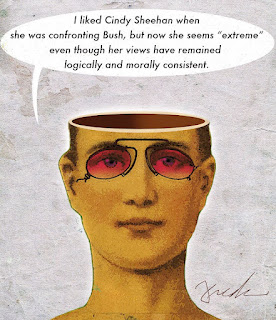You're Somebody
Cindy Sheehan
I have known about Erma
Steppe’s book, I’m Nobody: My Mother Said
it; I no Longer Believe it, for a couple of years now, through her
sister-in-law, and my dear friend, Missy Beattie.
I was recently at Missy’s
house in Baltimore visiting, and I was finally able to get my hands on a copy.
I am given many books, some I read, some I leave in cabs, some I throw on the
pile for later—but few that have been as riveting as Erma’s little (100 page)
autobiography.
If I had to describe the book
using one word, I would say, “honest,” but since I am not limited to one word,
I can say “brutal,” “touching,” “sad,” “funny” but, above all, “honest. “
Missy has been filling me in
on the book’s progress for a while now. There has been interest in movie rights
and talk of having it used as a teaching aid in college classrooms. After I
received the book, I made a vow to start reading it on my flight home and to
review it if I found it worthwhile, but what started as a chore and a favor for
a friend soon turned out to be a pleasure.
Erma was born in Ohio near
the end of "Double-U, Double-U Eye Eye" in 1944. Her first memories
are of hiding behind a door in what she later discovered was an aunt’s house.
Her aunt was caring for her while her mother did one of her many stints in
jail. Erma remembers being stepped over, stepped on, or jostled by this large
human—so behind the kitchen door was her refuge, and she thinks her bed.
Erma’s mother, Agnes, was an
abusive, mean, and cold alcoholic who goes through men like some people these
days go through computers—one every two or three years. Erma later discovers
that her aunt’s husband, Pap, is her father. This fact explains why her aunt
hates her so, but why does her mother hate her? Is it because Erma suffers (alluded
to in the book) sexual abuse from every one of Agnes’ boyfriends or husbands? The physical, emotional, and sexual abuse causes Erma to retreat from life and
become what she calls a “Shell.”
Erma’s writing is simple and
direct, but every so often she turns a phrase that takes the breath away
Describing the first instance
of sexual abuse by one of Agnes’ men: After
he began the abuse, I felt like an old can, rusty and dirty with nothing inside
me…Sexual abuse is the death of a child. It rips out what makes you want to be
close to other people…it never goes away, it remains in the crevices of your
mind (p11).
Erma and her siblings are
eventually taken away permanently from Agnes and sent to a strict children’s
home where “fostering” seems to be just a cover for child labor in the homes or
fields of the foster parent.
Reading Erma’s book, I was
struck by several things.
The first is her resilience
and the resilience of humans in general. She survived the abuse (one of Agnes’
men even gave her a “jail” tattoo that became severely infected) and eventually
married a good man with whom she gave birth to two sons and one daughter.
Erma used the experience of
her own upbringing to try and be a better parent to her children. Even though
her husband, Frank, was a good man, Erma never spoke of her horrible upbringing
to him, yet he never really asked. After 28 years, Erma felt that Frank was too
demanding and not very understanding, so she did another brave thing—she left
him. Erma raised her children, worked and was able to achieve a college degree.
The next thing I was struck
by was the fact that I was under the impression that I had a horrible
childhood: Abusive parents, alcoholism, poverty—the whole nine yards. But my
upbringing was Leave it to Beaver wonderful
compared to Erma.
And, finally, I found myself
feeling inexplicably sorry for Agnes: A woman who found her men far more
important than her children. Maybe my sympathy comes from the fact that over the years I have
been able to gain a little sympathy for my own parents, Dennis and Shirley.
There is no test for
parenting and back in the 40’s and 50’s abortion was illegal and reserved for
women who could afford a secretive one and dangerous for the poor. Sex Ed was
non-existence and birth control was spotty. Women, who had intercourse, whether
willingly or not, had very few options. Maybe Agnes and Shirley, growing up on
the edges of a society recovering from a Great Depression and War with rampant
racism and sexism, knew only one path: marriage and motherhood, ready or not?
You’ll be shocked, stunned,
maybe grateful, but definitely inspired by Erma’s tale of perseverance and
victory over her substantial roadblocks—one of which appears to be a severe
learning disability.
In the beginning of her book,
Erma says:
Maybe this book will help me understand myself. Maybe
I can learn to use my strengths, accept my faults, and understand my feelings. Maybe
there are other daughters and sons who will understand my story and know they
are not alone. I wish for them to find peace in their heart.
I started writing very soon
after my son, Casey, was killed in Iraq, and I know Erma is correct.
I highly recommend this book.
Erma self-published,
so to obtain a copy, send $12 (check or money order) to:
Erma Steppe
101 Cross Keys RD, Apt B
Baltimore, Maryland 21210.








